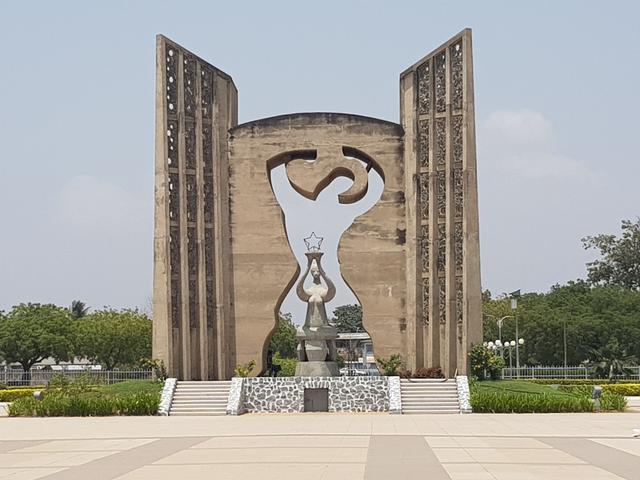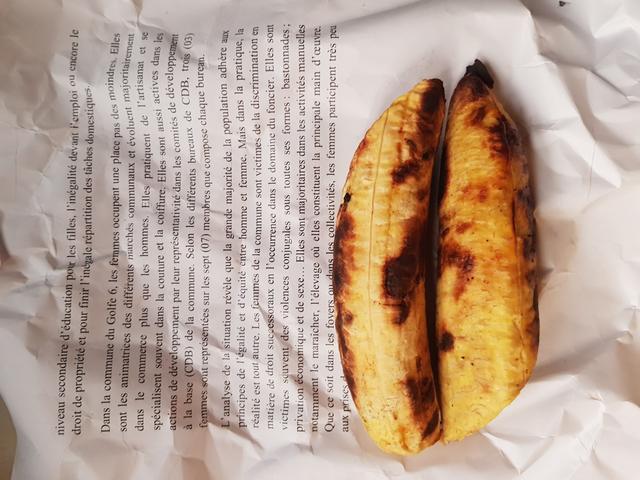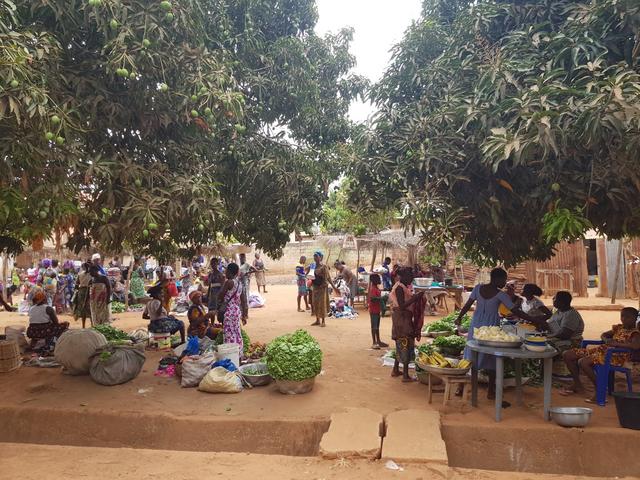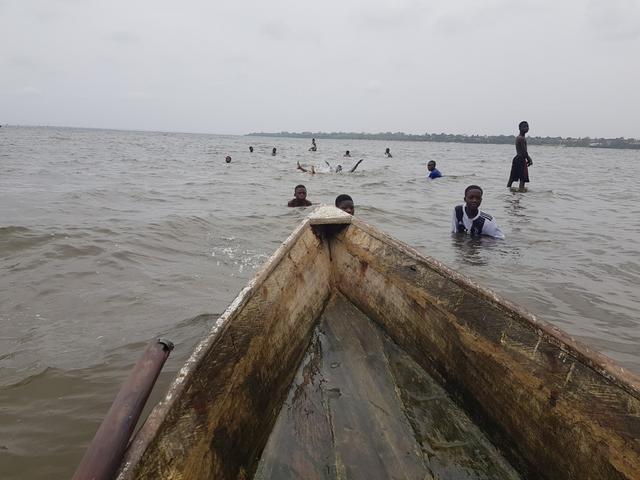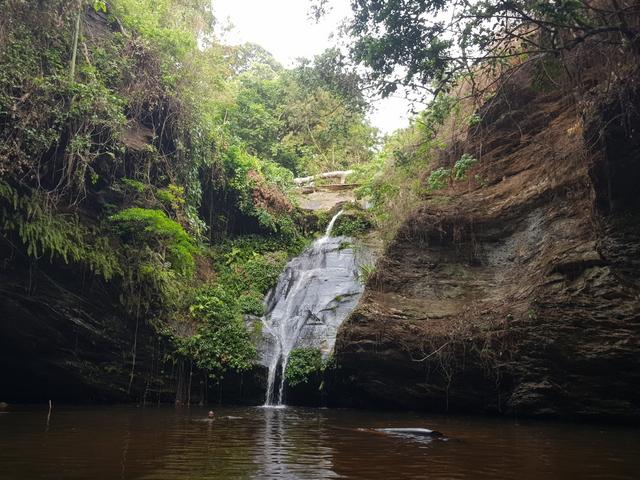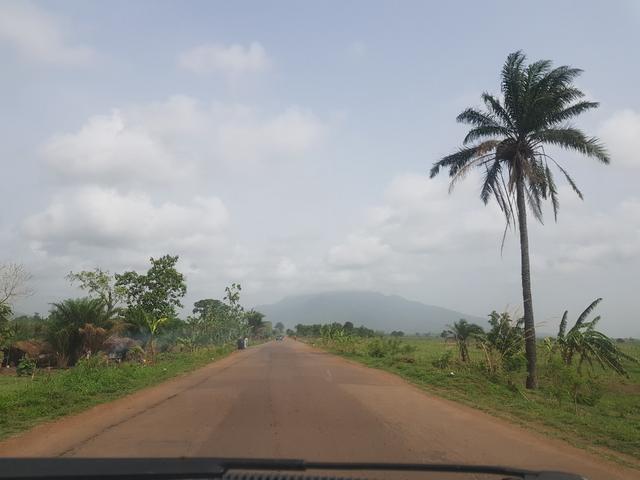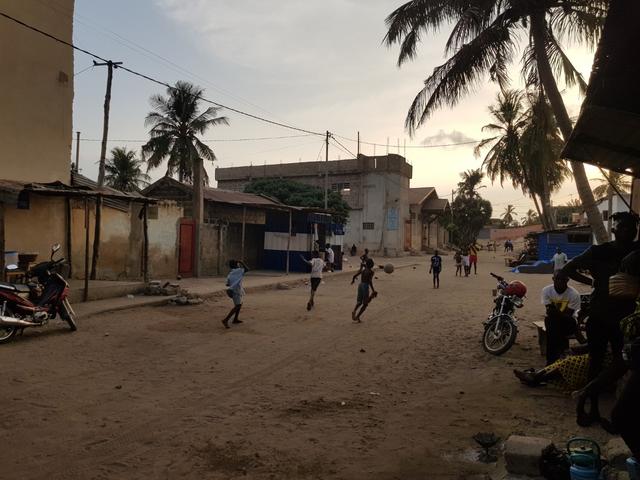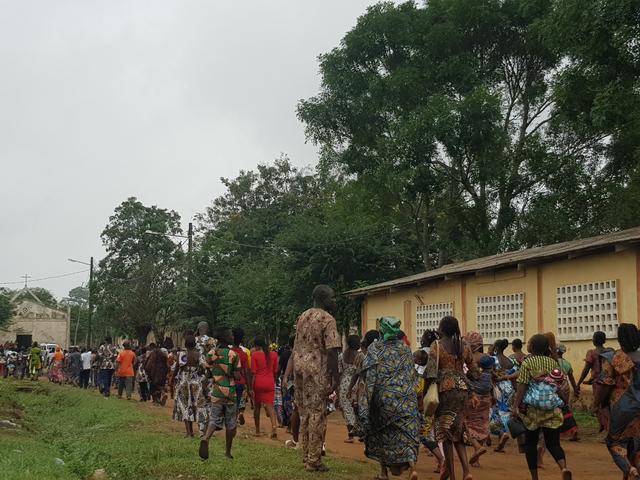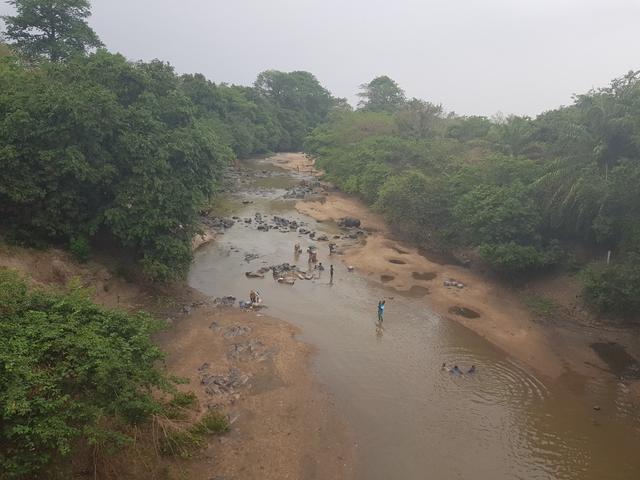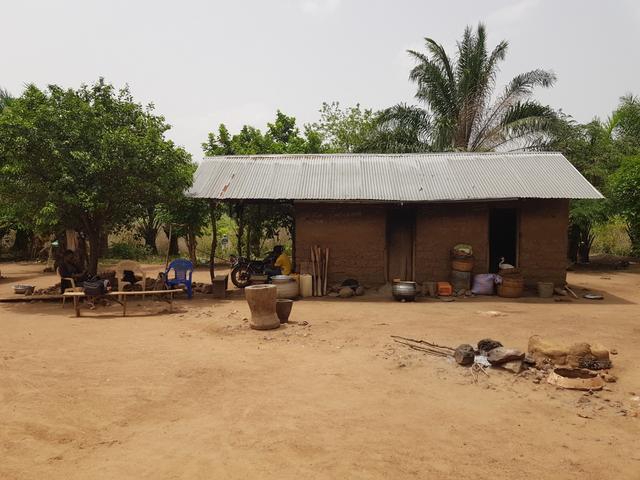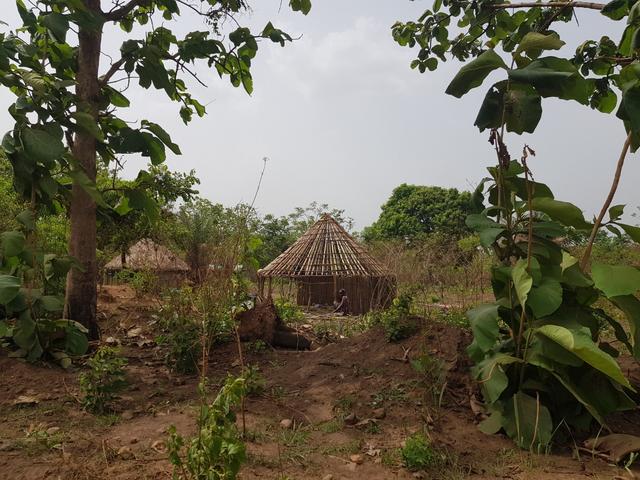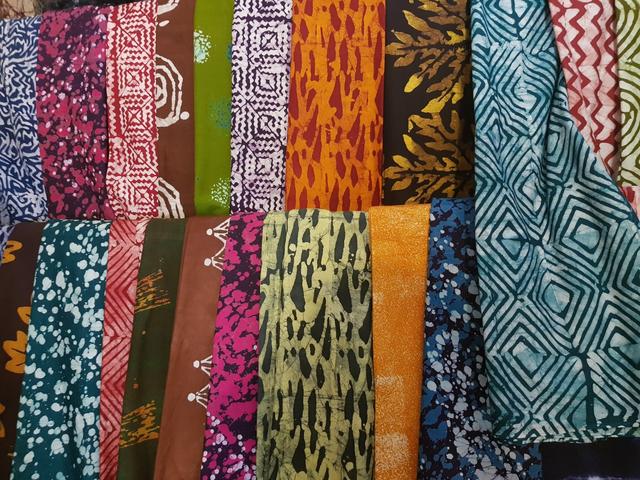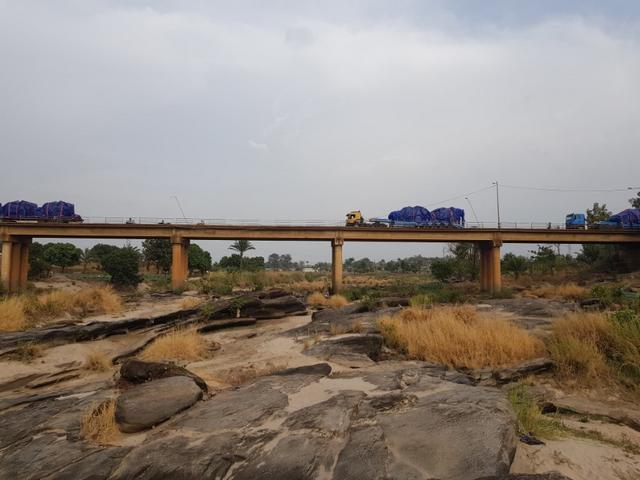Cotton production in Togo: challenges and limitations of field research
In this essay, I describe the process of conducting a field survey on cotton cultivation in Togo, which I conducted in March 2022, highlighting the constraints, challenges and ethical dilemmas that I encountered in my work and that influenced the study’s outcomes. The results are on display in the exhibition White Gold: Stories of Cotton.
I conducted field research on cotton cultivation in Togo, West Africa, between 3 and 29 March 2022 as a short term study mission of a larger COST Action TRACTS that enables research visits of PhD students and researchers at the beginning of their careers. I was curious to see possible traces of Slovenian presence from the period of the German colonial rule in Togo, stemming from the Anton Codelli collection from there (kept in Slovene Ethnographic Museum), and the impact of the German colonisation of Togo on cotton cultivation.
Main research question was how climate change is affecting cotton production and how are local farmers coping with the identified challenges. I spent most of my time in the capital Lomé, in the south of the country along the coast and in close proximity to the border with Ghana, where I commuted daily between the large university campus and the offices of various organisations. I was gathering information on the organisation of the agricultural sector in the country and the problems caused by climate change, and obtained contacts of cotton farmers, as I wanted to focus on their understanding of the situation and the strategies they were trying to use to tackle the problems identified.
I collaborated with my host Dr Patchani Patabadi, Professor of English at the Department of English at the University of Lomé, and students of English Language and Literature programme there: Esso-Essoou Gnarou (Frank), Essozolam Batchassi (Mathilde), Ami Deborah Madzra and Razak Gafa and Toxima Emmanuel Alaka from the English Language and Literature programme at the University of Kara.
Their invaluable help in interpreting different West African languages (eg. Ewe, Kabiye) and French made it possible to carry out the fieldwork research. Due to the social and cultural differences in navigating the everyday life, I had to rely on the help of the locals. Many acquaintances and passers-by always kindly helped to navigate daily life from transport, food, communication and accommodation to coordinating the demands of the work and the possibility of its success.
I chose my fieldwork interlocutors on the basis of several criteria: (1) I spoke to researchers and professors who are experts in the field of agronomy, technology and cotton production. (2) In agricultural sector, I chose organisations which are directly involved in the lives and activities of farmers and in the organisation of farming. (3) In the NGO and media sector, I was interested in those informing and educating about climate change, ecological and agronomic issues. (4) Besides accessibility in the case of farmers, an important criterion was that they had been involved in cotton farming for several years.
I recruited interlocutors surfing the web, based on recommendations from other interlocutors and through gradual understanding of the infrastructure of the agricultural sector in Togo. After identifying key institutions and areas, I contacted relevant experts and institutions by telephone with the help of interpreters. In the course of the conversations, I noted down additional contacts, sometimes explicitly asking for contacts or introductions. My interlocutors were initially researchers from the University of Lomé, mainly agronomists from the Faculty of Agronomy, who spoke to me about the local farming conditions (such as pertinent features of climatic and agro-ecological zones), the structure of the agricultural sector, various research activities pertaining climate change and/or cotton production, developmental strategies and technological needs as well as various challenges they face (diseases, insects, climate change, etc.). I did not have access to most of the important institutions and their representatives due to the specifics of their political system, importance of hierarchy with accompanying rules in interpersonal relations and the short duration of the fieldwork (see below). In addition to the professional and scientific research in this field, I was also interested in how the public is informed about the climate change more generally. I thus contacted several organisations: Jeune Verte Togo (Young Green Togo), Eco-Conscience.tv and Agro Digitale. I conducted two video interviews with environmental activists: a project manager of Jeune Verte Togo, Raissa Oureya, and a UN representative and the head of Eco-Conscience.tv, Rolande D. Aziaka.
After discussions, which shed light on the general picture of agriculture and climate change as well as more specifically cotton production in the country, I tried to get in touch with farmers. With the help of agricultural consultant and businessman Dr Jonas Kao Papa, I managed to obtain a list of local groups of cotton producers in Togo. Based on the accessibility of the villages listed and farmers' responsiveness over the phone, I arranged to record a video interview with several people who agreed to be interviewed. It was only in the second half of the fieldwork that it was possible to organise visits to other towns and, in particular, to smaller villages where cotton farms are located. I visited three villages and interviewed eleven farmers. I managed to visit the south-western town of Kpalimé in the Plateaux region, which is known for its cooler climate with more rainfall. Within the same region, I travelled to the north to the centrally located town of Atakpamé, near which Codelli, engineer living in Slovenia, was leading a project to build a German radiotelegraph station. The northernmost town I travelled to was Kara, in the region of the same name. Farms were not located in the towns themselves, but had to be reached in remote villages by private transport.
Challenges
My brief preparations for the fieldwork in a new, unfamiliar culture and society were hampered by the unavailability of relevant literature in English and people who could share their own experiences of living or working in Togo. I was limited to a few pages in tourist guides to West Africa and specific anthropological literature, mainly related to certain ethnic groups (e.g. Piot, 1999), as well as a few online sources. Inexperience with ethnographical fieldwork and unfamiliarity with local ways of daily life made advance preparations difficult and precluded the anticipation of potential problems. At the same time, I was faced with time and financial constraints. There was little time during preparation and fieldwork to build up a network of contacts, connect with people, obtain relevant information as well as conduct meetings and interviews. The grant, which covered living expenses, wasn’t enough to cover additional expenses to pay an interpreter and a driver, which would have allowed easier and longer access to the farms and cotton producers.
During the fieldwork I was based in the capital Lomé, which is home to the country's largest university, many researchers in the field of interest, NGOs and media organisations, but there are no farming areas or cotton producers in and around this coastal town. I lived in a house enclosed by a wall, barbed wire and a house guard, which meant greater security but also relative isolation from the community I was living in. As a precaution, I rarely travelled alone, always during the day. The lack of public transport in the huge capital city necessitated a reliance on private transport services such as taxis (car, motorbike), without which getting around the city would be virtually impossible. For safety reasons, I used a car-taxi rather than a motorcycle-taxi without a helmet when travelling longer distances, which meant a greater financial burden. To organise the commute between cities, it was necessary to know the right people who could direct me and arrange bus transport with the help of local transport companies. It wasn’t uncommon to encounter regular roadblocks where police checked the vehicles (mainly of traders), as well as daily armed patrols on campus and armed security guards siting in the shade in front of every bank. This gave me both a feeling of safety and relative un-safety, but I did not experience any misunderstandings or uncomfortable situations during my visit to the country. Due to their socio-political system and the general discouragement of discussing it with news of journalists being imprisoned for criticising corrupt ministers, I avoided socio-political topics for my own safety and that of my interlocutors.
Although the locals speak different mother tongues, almost all also speak French and, in exceptional cases, English. Not being fluent in French proved to be the biggest obstacle which made it difficult to work independently as I always needed interpreters by my side. The English students were volunteers who have never done this kind of work before, which often meant that they were only summarising and not translating what was said verbatim. My inability to pay them for their work, their inexperience, the difficulty of interpreting and their lack of knowledge of subject-specific vocabulary meant that the translations were of poorer quality and some of the translated information was questionable. When the students had daily lectures at the university, my work was completely impossible.
In addition to the linguistic obstacles, I was dealing with a lack of understanding of my work, often accompanied by suspicion. It was difficult to explain why I had come to Togo and the purpose of obtaining information on cotton production and climate change and why I need to conduct video interviews with farmers. My lack of agronomic training came across as strange, and they explained my presence in their own way, sometimes due to their lack of understanding of anthropological work, despite my very comprehensive explanations: either I was coming as an expert to give them solutions and answers, or I wanted to develop my own business idea - to grow cotton in Togo, or to export their crops and the expertise of cotton cultivation to Slovenia.
Conducting the research
During the ethnographic fieldwork in Togo, it became apparent that access to relevant actors in the field of research required making arrangements and obtaining authorisation from the management of the organisations in question. Because the arrangements for my visit as an international researcher at the University of Lomé were not made in time by my host, access to the researchers on campus was also hampered. Through these examples, strong hierarchical social arrangements, which usually require face-to-face meetings, were revealed, delaying or preventing access to representatives of the organisations. I was unable to make prior arrangements with other relevant organisations due to the difficulty of obtaining contacts, as I was confronted with non-existent or outdated websites and inaccessible or defunct telephone numbers. Personal connections through a chain of acquaintances proved to be the most successful and effective way to obtain interlocutors.
After obtaining the relevant contact details online or through acquaintances, the main problem was the non-responsiveness to emails and/or phone calls. During the preparations for fieldwork, organisations did not respond to messages written in English, and when writing again in French during the fieldwork (with an explicit request for formal authorisation), there was also no success. Some of the organisations I managed to contact either refused to participate due to lack of authorisation from the management, or the representatives initially agreed to a meeting but then did not respond to further calls. During meetings with some researchers and experts, they were reluctant to provide official or at least authorised information and did not allow the recording of the conversation. The one-month visit proved to be too short to carry out all the necessary procedures to obtain the support and consents of the organisations. The time constraints of the fieldwork limited the possibility to meet with the managers to present my work and to obtain authorisations on the basis of which the experts in the organisations would have agreed to interviews and possibly video interviews with me. This made it very difficult to immerse myself in the research, get interviewees and textual materials.
Thus it was difficult to proceed with the research with work schedule being in constant flux. By a lucky coincidence, I saw a PhD thesis on technological adaptations due to climate change in the agronomy sector by Jonas Papa Kao on the desk of a professor of economic agronomy, which I asked for the student's contact. After talking to Kao, he promised me a spreadsheet of contacts of cotton growers in the whole country. His help was crucial in enabling me to find out who was producing cotton and where, and to gradually start planning visits to farms. I needed the help of local people with knowledge of the local geography to find out where the farms were located, as most of the villages were not marked on the map. The initial mistrust of the growers was dispelled by the use of the local language by the students who helped to arrange the interviews. After the interview was arranged, it was still necessary to find suitable transport and an interpreter who could accompany me on the journey.
In informal meetings with researchers and representatives of organisations, I have prepared questions in advance and asked additional questions for a more in-depth understanding of what has been said. As the interpreters were not proficient in agronomic and economic vocabulary, they had difficulty interpreting those terms into English. My passive knowledge of French, the similarity of terminology in the Indo-European languages and the repeated use of technical terminology helped me to understand what was being said. The video interviews with cotton producers were not simultaneously interpreted, as this would have required too much time and effort for both the interpreter and the interviewee. There were many occasions when the interpreter did not translate the question verbatim, giving a summary instead, as well as multiple occasions when the interviewees did not answer the question directly.
Due to time constraints, it was difficult or impossible to meet with the interviewees multiple times, the only exception being Raissa Oureya from the NGO Young Green Togo. Interlocutors did not have the time or it would have been too time-consuming to arrange additional meetings due to the lengthy planning of agreed time for the meeting, coordinating transport to the location and interpreters. As a result, there was no opportunity for a more in-depth perspective, to provide additional explanations, address ambiguities and to create a more coherent picture from gathered information. There was insufficient time to reflect, perceive gaps in the data and to organise several meetings in order to create a more comprehensive understanding of the cotton sector in Togo with the help of different interlocutors. The lack of time also meant less time to get to know the interviewees and their environment, which meant that interviewees were sometimes stiff and my questions were superficial. This made the work both slow and fast, lacking the hurrying and hyper-productivity that characterises Slovenian society, but at the same time running out of time for depth.
Ethical aspects
I entered Togo as a white European woman and during my stay I was one of the few white people which I met only at specific locations. When I visited an acquaintance in a seaside hotel, confusingly looking for the location, the security guard openly directed me towards the entrance, because (I believe) he thought I belong in that environment of affluent turists. The rare supermarkets, where one could buy imported French, and therefore familiar, products, gave a pleasant feeling of homeliness, but due to the high prices only rich locals and white people were their customers.
Homely feelings in the pizzeria in the northern city Kara, were shared by many as I soon realised it was a regular meeting place for white people who lived there. I stood out and attracted a lot of attention, especially from the children interested in my looks as well as some men who approached me to talk to but soon gave up when they realized I didn’t speak French. Many locals addressed me with the words blanche and yovo, meaning white. The clear visual difference as well as the symbolic weight of my whiteness, combined with my inability to speak French and lack of knowledge of their culture and society, created a great gulf between me and my interlocutors. Although it was clearly visible that I had a different role as a woman, my whiteness as a difference, something interesting and visual mark of unequal global positioning blurred or complicated the gender aspect. I was approached by men with marriage proposals a few times, but never too intrusively, nor did anyone invade my personal space. In that sense, I felt safer than in many European cities. The gender aspect was more pronounced in my work, as female interlocutors were less frequent and I mostly spoke to men. In everyday life, women were the exception in making contact, which was not unusual for men. Both the researchers and the farmers were men, although women farmers are common, have their own association and various organisations encourage their work. The exceptions were two female activists working on environmental issues with whom I conducted video interviews.
It was difficult for me to establish a genuine contact with the students who helped me with my work, because of the enormous difference in our lives. We imagined each other's world in a rather abstract way, and it was much harder for them to imagine (I on the other hand was there) cultural and politico-economic differences (e.g. imagining that we have a completely different climate in Europe, we eat different food, etc.), because of the limited material possibilities and other constraints.
Difference in material conditions of everyday life seems nevertheless a lesser obstacle than conciliating completely different symbolic worlds we inhabit, different worldviews and fundamental social differences. The differences in accessibility of cultural activities and services of the welfare state in our country stand out from the scattered provision of social services by public, private and humanitarian institutions in Togo. The clear difference between me and them, which prevented me from crossing over to their side in this short period of time, was my class and social positioning, yet from my perspective I was conducting the research with the help of a modest grant, which I handled with extreme care and frugally in order to be able to do my work as well as possible. I found myself in a situation of internal conflict where I was claiming that I had no money and could not share it with them and repay them for their work, and yet it was clear that I had an unimaginably large amount of money comparing to them. This further exacerbated my perception of unequal exchange, as I was getting time, work and information from them, and I was finding it difficult to repay them. Despite my efforts to offer them various favours (e.g. studying, revision for exams, socialising) in appreciation of their help, they rarely responded to these initiatives and I was unable to anticipate their needs.
The distance grew larger when I met the cotton growers, as I was on a tight schedule due to transport constraints. It was difficult to find common ground, as I clearly approached in a manner similar to a journalist, with a camera standing between us almost all the time. There was also a really bizarre disparity between me being equipped with modern technology and their environment with no running water and limited electricity, and I could not promise or advise them on anything in response to my requests for help and cooperation. Instead of talking to them and trying to understand their living world, the problems they face and how they solve them, I spent more time on the camera set-up, adjusting our interaction according to the mediation of the technology: "speak louder," "don't murmur while they speak," "look at the camera." It was hard for them (as it was sometimes for me) to understand why I needed this information, especially since I did not come as an expert who could help them. Otherwise, the farmers were very engaged to talk to me about their work, agriculture, problems and the impacts of climate change. Sometimes the differences between me and them seemed particularly pronounced - they found my questions strange (they laughed out loud at some of them), while I sometimes found their answers strange. They approached the interview with interest, the situation was new and different to their everyday life. They were at times reticent to criticise the system or their own structural situation, yet they could not hide their own dissatisfaction. There was a sense of caution towards addressing the national politics and global political-economic processes of which they hardly spoke. Despite their interest, there were also times when they showed disappointment that they expected more from my visit than just (long and arduous) interviews.


